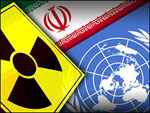 Reuters: A U.N. nuclear watchdog report due this week is expected to show that growth of Iran’s stockpile of higher-grade enriched uranium has slowed as it is using some of the material to make reactor fuel, diplomats said on Wednesday. By Fredrik Dahl
Reuters: A U.N. nuclear watchdog report due this week is expected to show that growth of Iran’s stockpile of higher-grade enriched uranium has slowed as it is using some of the material to make reactor fuel, diplomats said on Wednesday. By Fredrik Dahl
 VIENNA (Reuters) – A U.N. nuclear watchdog report due this week is expected to show that growth of Iran’s stockpile of higher-grade enriched uranium has slowed as it is using some of the material to make reactor fuel, diplomats said on Wednesday.
VIENNA (Reuters) – A U.N. nuclear watchdog report due this week is expected to show that growth of Iran’s stockpile of higher-grade enriched uranium has slowed as it is using some of the material to make reactor fuel, diplomats said on Wednesday.
If confirmed in the quarterly report, the development could help buy time for big power diplomacy to try and find a negotiated settlement to a decade-old dispute that has stirred fears of a new Middle East war.
Six world powers and Iran are due to meet for the first time in eight months next week to try again to break the stalemate but analysts expect no major progress toward defusing suspicions of an Iranian quest for nuclear weapons capability.
Israel, which has warned it might bomb Iran’s nuclear sites as a last resort, last year gave a rough deadline of mid-2013 as the date by which Tehran could have enough higher-grade uranium to produce a single atomic bomb.
But if Iran is converting some of that uranium to yield reactor fuel, thereby at least temporarily removing it from the stockpile that could be used for weapons if processed further, that may postpone the Israeli “red line” for action.
Any relief for Western powers may be short-lived, however, as Iran also plans to deploy advanced enrichment machines – a step that could speed up its accumulation of material that they fear could be used to devise a nuclear weapon.
One diplomat said Iran may already have moved to install dozens of the new machines at its main enrichment plant near the central town of Natanz, but they were not yet operating.
Also underlining Iran’s defiance of international demands to curb its nuclear program, diplomats say it is technically ready to sharply expand enrichment at its Fordow underground plant, which is now operating at a quarter of its capacity.
Refined uranium can fuel nuclear energy plants, which is Iran’s stated aim, or provide the core of an atomic bomb, which the United States and Israel suspect may be its ultimate goal.
Enriching uranium to a fissile concentration of 20 percent is especially worrisome for the West as it represents most of the work required to obtain weapons-grade material. Iran says it needs this enrichment level to fuel a medical research reactor.
“There is continued enrichment … but they have also resumed the fuel plate production for the Tehran research reactor so that has offset some of the 20 percent stockpile,” a Western diplomat said. “I think there will still be a small increase in the 20 percent (stockpile).”
BIG POWER DIPLOMACY
Another diplomat said the report by the International Atomic Energy Agency (IAEA), expected on Thursday or Friday, may show relatively modest growth in the stored amount of higher-grade uranium as a result of a resumption in fuel conversion.
Reuters reported earlier this month that Iran had resumed using small amounts of its 20 percent uranium to make reactor fuel. Wednesday’s comments by the two diplomats indicated a larger fuel conversion activity.
But a third diplomat said he did not believe Iran had undertaken “a huge conversion campaign” and that the stockpile could still increase significantly, though at a somewhat slower pace than it would have done without any fuel production.
Iran last year used nearly 100 kg (220 pounds) of the stockpile to make fuel for its reactor producing medical isotopes. It suddenly halted the process in September, leading to a jump of nearly 50 percent to 135 kg in the 20 percent uranium reserve by the time the IAEA issued its November report.
Experts say that up to 240-250 kg would be required for a nuclear bomb, if refined to 90 percent. If Iran did not convert any of the material for fuel, and at current enrichment rates, it could reach this point around June.
The Islamic Republic denies Western allegations that it is seeking to develop the capability to make nuclear arms and says it is Israel’s assumed nuclear arsenal that threatens peace.
But the country’s expanded uranium enrichment program and lack of full cooperation with U.N. nuclear inspectors have drawn increasingly tough sanctions on the major oil producer.
The United States, Russia, China, France, Britain and Germany are due to meet Iran for talks in Kazakhstan on February 26 to tackle the dispute over Tehran’s nuclear aspirations.
They want Iran to halt 20 percent enrichment, shut Fordow and ship out the stockpile. Iran wants a recognition of what it sees as its right to refine uranium and an easing of sanctions.
Analysts and diplomats say Iran’s presidential election in June will make it hard for the Islamic Republic to make any concessions to foreign powers at this point.
“They don’t want to move an inch,” one Western envoy said.
(Editing by Mark Heinrich and Tom Pfeiffer)


